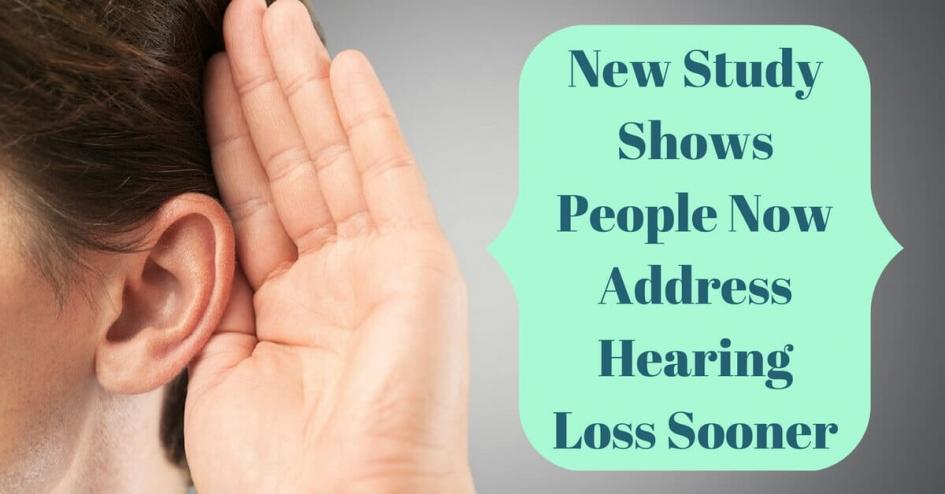
New Study Shows People Now Address Hearing Loss Sooner
2017 begins with some good news – Brits are getting treated for their hearing loss sooner than ever before. A new survey shows that more than 4 in 5 people in the UK now get hearing aids within the first two years of noticing their hearing loss. This is a great improvement on previous survey results. Traditionally, people have waited an average of 7 years between becoming aware of their hearing loss and getting a hearing aid. Hearing loss can be daunting to deal with and many people prefer to ignore their symptoms rather than get them checked out. This has always been a cause for concern for hearing specialists, because untreated hearing loss can have a negative impact on a person’s health, social life and general well-being. This survey shows that the tables are finally turning, and for the better.
Sooner rather than later
The European Hearing Instrument Manufactures Association (EHIMA) carried out the study of hearing aid users between 2015 and 2016. The results indicate that dealing with hearing loss is no longer such a stigma. Across Europe, nearly 3 in 4 people now get hearing aids within the first three years of noticing their hearing loss. Results from the UK show that 18% of the people surveyed acquired hearing aids within the first year of their hearing loss. This rose to a massive 69% by the second year – meaning that nearly 90% of people had treated their hearing loss within two years. France, Germany, Italy, Switzerland and Denmark showed similar trends. In short, this means that people with hearing loss have a much better chance of protecting their health.
What happens if you don’t treat hearing loss?
We all know the negative stigmas associated with hearing loss, and it can be hard to acknowledge it is happening to you. As a result, people tend to overlook the first few symptoms or deny that their hearing has changed – but it’s important not to wait too long. Untreated hearing loss can have a serious impact on our quality of life. Worryingly, it is also linked to conditions like depression, Alzheimer’s disease and dementia.
- Hearing loss makes communication harder, which can have a knock-on effect on your personal relationships, friendships and social life. This can cause a person to feel isolated and alone, and lead to anxiety and depression.
- When your hearing begins to change, you often lose the beginnings and ends of words. While you can still hear, your brain has difficult making sense of the sounds it receives, making it tricky to understand spoken conversations. If your hearing loss is left untreated, there’s a risk that your brain will forget how to process sounds, and you have to relearn your acoustic memory. This can be a long and frustrating process.
- While your brain is working hard to process sounds, the other tasks it needs to perform are neglected. As a result, memory, concentration and comprehension can suffer. This can lead to people ‘slowing down’ before their time, which can have a serious impact on work performance and lead to reduced income. It can even lead to a loss of brain tissue, and as a result, a person with untreated hearing loss may be more at risk of dementia and Alzheimer’s.
- There’s also a basic safety risk. People with hearing loss may miss fire alarms, sirens and safety announcements. They are also more at risk of falling.
How do hearing aids help?
Hearing aids give you access to a wider spectrum of sound and enhance the way you hear. The sooner you get hearing aids, the sooner you can pick up where you left off. While it takes some time to get used to them, the learning curve is much smoother and faster when your hearing loss is still in the early stages. It is also much easier to adapt to hearing aids at this point. Better hearing means better communication. Hearing aids should give you back your confidence and independence, so you can take part in all your usual social activities without worry. You won’t have to strain to hear, which means you will have more brain space free. As a result, your memory and communication improve and your risk of cognitive decline decreases.
What to do next
If you think you have hearing loss, it is important to get tested and treated as soon as you can. Hearing tests are non-invasive, and will identify what kind of hearing loss you have. Your hearing specialist will be able to recommend treatment and help you find a hearing aid that suits you. The sooner you do this, the sooner you can reap the benefits, protect your health and get back to enjoying life. You can make an appointment with one of our hearing specialists by calling 0131-200-1200, contacting us online or popping in to one of our centres.
House of Hearing UK
Edinburgh | Galashiels | Perth | St Andrews
0131 220 1220
Our Clinics
All House of Hearing clinics are in town centre locations and accessible to public transport and parking. Home visits also available if mobility is an issue.


.png)
.png)
.png)

.png)
